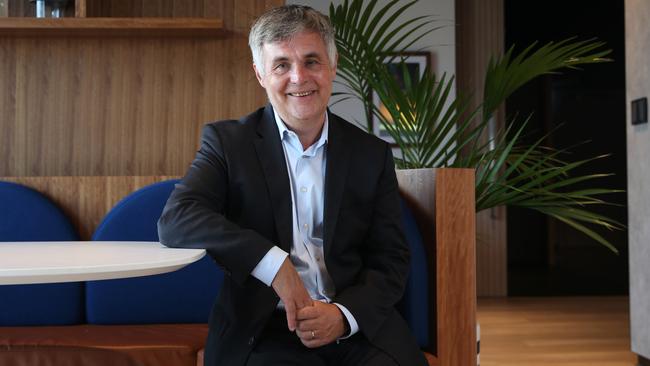Cost of living no pressure for NBN Co
The government-owned company says customers still have the need for speed, as pricing negotiations with retailers including Telstra and Optus drag on.
Business
Don't miss out on the headlines from Business. Followed categories will be added to My News.
Cost of living pressures have not had an impact on NBN’s revenues and households are continuing to switch to higher-speed, higher-cost speed plans, according to NBN Co chief executive Stephen Rue, as his company lifted underlying earnings by 15 per cent and said it has now connected more than 8.5m homes and businesses to its network.
In its full year results NBN Co shrugged off economic pressures and posted earnings before interest, tax, depreciation and amortisation (EBITDA) of $3.5bn for the 12 months to June 30 – up 15 per cent from a year earlier – and at the top end of guidance set out its 2023 corporate plan.
It reported total revenue of $5.27bn, up 3 per cent, and said it benefited from a combination of increased activations and improved residential average revenue per user, with customers increasingly choosing higher speed plans.
The government-owned company announced it had raised a further $5.69bn in capital markets and bank debt and has now repaid $14bn of its $19.5bn Commonwealth loan, still owing $5.5bn. It posted a net loss for FY23 of $1.12bn, an improvement of 24 per cent compared to a net loss of $1.47bn a year earlier.
“We haven’t seen that to date,” Mr Rue told The Australian when asked whether cost of living pressures had affected consumer choices.
“Clearly cost of living is something that as a provider of broadband services we are very conscious about, and when we’ve looked at our pricing, we haven’t just looked at ways in which we can assist retailers to provider higher speed tiers to consumers, we’ve also looked at the lower speed offerings, enabling retailers to provide services to a cohort of consumers who are cost conscious.”
Mr Rue downplayed the rise in popularity of Elon Musk’s Starlink satellite service, declaring that it hadn’t impacted NBN Co’s own satellites, which are set to be replaced by the end of this decade when they reach end-of-life. He said NBN’s satellites aim to cover around 300,000 homes nationally out of 12.3m, and that its customers had responded well to an upgraded ‘Sky Muster Plus’ offering that offers uncapped data during off-peak times.
Some retailers including Telstra and Vocus have inked deals with Starlink to offer low-orbit satellite services to consumers, but Mr Rue said most consumers will still prefer to use fixed-line or fixed wirelss services, which can handle much more data.
Mr Rue said there were “not a lot of surprises” in the results that met his government-owned company’s key performance metrics and full year guidance as set out in its 2023 corporate plan.

“Our responsible and sustainable financial growth, alongside prudent investments to extend the reach of fibre, fixed wireless and satellite capabilities, has meant the NBN network continues to play an essential role for communities across Australia,” he said.
NBN Co’s negotiations with retailers over pricing and controversial connectivity virtual circuit charges continue to drag on, with Telstra, Vocus, Optus, Aussie Broadband and TPG all coming out against its recent proposals.
Mr Rue said NBN Co will resubmit pricing proposals to the competition watchdog in coming days.
“We looked at the feedback we got from the ACCC on our previous proposal and we have sought to address all of those issues,” he told The Australian. “As a result we believe we are lodging something that is capable of acceptance.”
Earlier this year, the group unveiled a new set of wholesale pricing for 2024 to 2026 which will see prices rise by almost eight per cent over two years, and said the price rises were based on the Reserve Bank’s published inflation forecasts.
NBN Co in March revealed plans to axe around 500 roles – or about 10 per cent of its workforce – joining a growing list of organisations hit by the global “tech wreck”. The roles were mostly across middle and senior management.
At the end of July, the group also announced it had hooked up an additional 2m premises across the country with upgrades to full fibre connections, with eligible premises able to receive download speeds of close to 1 gigabit per second.
Mr Rue, a former News Corp executive, has served as NBN Co chief executive for five years and said he remained energised in what’s arguably one of the public sector’s most demanding - and highly renumerated - roles.
“As an immigrant to Australia over 30 years ago, it’s been a real privilege to work for an organization that’s providing so much benefit to Australia,” he said. “I started here in 2014, and I was very much part of the team that built out a plan for how we’re going to build a network by 2020. And now I’m very privileged to lead a company that’s upgrading fibre, fixed wireless, and being part of a program to hopefully create certainty in the regulatory space.
“There’s a lot more to be done, it remains an exciting job and it’s a privileged job. There’s almost no better time to be in this industry and I often say to our people that the best years are ahead of us, and I still think that’s the case for NBN.”
More Coverage
Originally published as Cost of living no pressure for NBN Co





